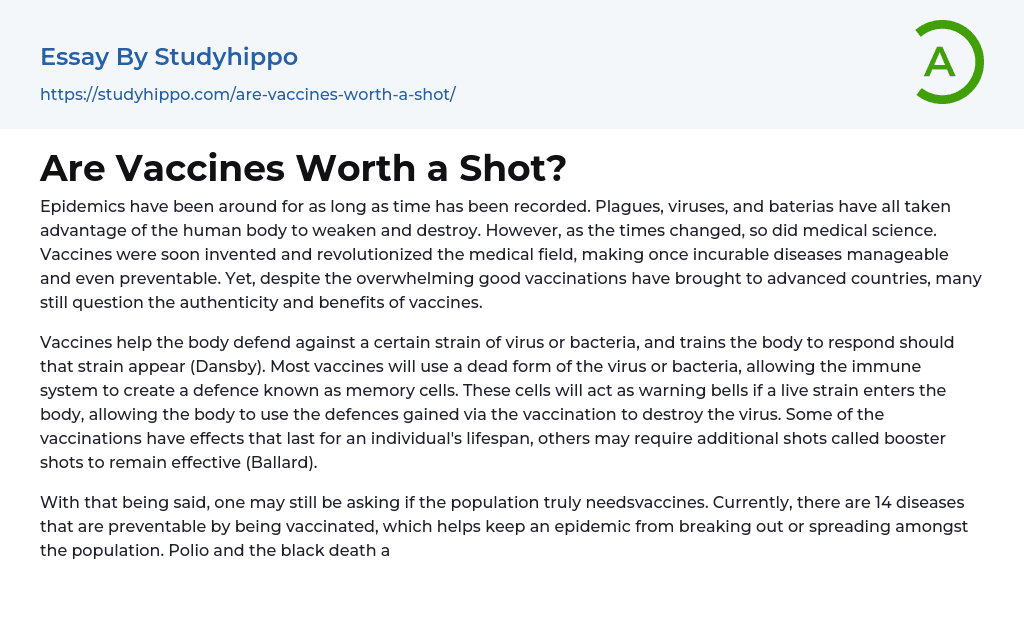Throughout history, epidemics have constantly been present; plagues, viruses, and bacteria have all exploited the human body to induce weakness and devastation. However, there has been continuous advancement in medical science.
Vaccines have revolutionized medicine, providing a means to manage and prevent once incurable diseases. Despite the benefits they bring to developed nations, doubts about the authenticity and advantages of vaccinations persist. Vaccines help the body defend against specific strains of viruses or bacteria and teach it how to respond when exposed to those strains (Dansby). Most vaccines use an inactivated form of the virus or bacteria, allowing the immune system to create memory cells as a defense mechanism. These cells serve as alerts if a live strain enters the body, enabl
...ing it to utilize the defenses acquired through vaccination to eliminate the virus.
Some of the vaccinations have effects that last for an individual's lifespan
, while others may require booster shots to remain effective (Ballard).
Nevertheless, one may still question the necessity of
vaccines
. Currently,
14 diseases are preventable through vaccination
, which helps prevent epidemics and their spread among the population. Examples of eradicated threats include polio and the black death, as long as individuals are
vaccinated
.
These diseases once caused devastating consequences for humanity, making it crucial to keep them under control (Dansby).
The black death, a devastating plague, ravaged Europe and killed around one-third of its population. During that time,
the limited advancement in medical science allowed the disease to spread uncontrollably. Infected individuals suffered from symptoms like fever, the emergence of dark spots on their skin, infection spreading to other organs, and eventually slipping into a coma or succumbing to death. Nevertheless, with the progress of scientific knowledge, a vaccine was discovered which resulted in urban countries witnessing a decline in cases and outbreaks, ultimately reducing the number of infected individuals close to zero (Peters). Similarly, polio - another infectious disease - has mostly been eliminated in urban areas due to vaccination efforts. Polio primarily attacked the spinal cord of those affected and often led to paralysis or fatal outcomes.
Eventually, a polio vaccine was introduced to the United States in approximately 1955. As stated on the CDC website, there have been no reported instances of polio in the United States since around 1979. The necessity of vaccines also greatly impacts overall public health. By receiving vaccinations, a significant majority of the population helps alleviate the severity of flu season and safeguards both themselves and those around them from contracting the virus when it is most widespread (Ballard).
While the majority of people support vaccines, there is still a small number who have doubts. These doubts are mainly fueled by a group known as "anti-vaxxers." Anti-vaxxers choose not to vaccinate themselves or their children due to concerns and skepticism towards the medical field and vaccinations. As time goes on, their beliefs and actions are having an increasingly noticeable impact.
Anti-vaxxers hold various beliefs and motivations for rejecting vaccines. Some argue that improved sanitation and
hygiene have played a significant role in reducing diseases, rather than vaccines completely eliminating the risk. Others believe that vaccines do not provide complete protection because getting a "live" vaccination, which contains a weakened form of the virus, could potentially result in experiencing a milder version of the disease. A minority of anti-vaxxers even go so far as to claim that administering vaccines to children can lead to health problems such as autism.
The main cause of these issues is the lack of trust in science and/or the government. Healthline states that anti-vaxxers are influenced by politicians and doctors who prioritize money above all else, leading to the resurgence of diseases like measles and whooping cough that were once thought to be eradicated. Despite the fact that vaccination can easily prevent these highly contagious illnesses, progress has been hindered by the rise of anti-vaxxers. This not only puts those who remain unvaccinated at risk but also poses a threat to those around them (Dansby). On the other hand, medical professionals offer substantial evidence disproving the claims made by anti-vaxxers.
According to the Oxford website, these professionals provide proof through studies, experiments, and journals.
- alternative medicine essays
- Aspirin essays
- Cannabis essays
- Cardiology essays
- Cloning essays
- Dentist essays
- drugs essays
- Hemoglobin essays
- Medical essays
- Medical Ethics essays
- Organ Donation essays
- Patient essays
- Pharmacology essays
- Plastic Surgery essays
- Surgery essays
- Therapy essays
- Vaccines essays




